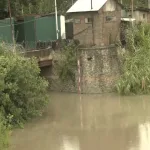Srinagar, Apr 21: Director Extension, SKUAST, Prof Raihana Habib Kanth on Monday issued advisory for farmers in view of recent hailstorm in various areas of Kashmir valley and prevailing disease favorable weather conditions.
Farmers were advised to follow advisory to prevent the infection and spread of any fungal disease in the affected crop / area.
For Apples, advisory said that to avoid petal fall, farmers need to immediately spray with any of the following fungicides Difenaconazole 25 EC @ 30 ml per 100 liters of water or Flusilazole 40 EC @ 20 ml per 100 liters of water or Penconazole 10 EC @ @ 50 ml per 100 liters of water.
Stage: Fruit let stage Spray immediately with any of the following fungicides
- Zineb (68%) + Hexaconazole (4%) 72WP @ 125 g per 100 liters of water OR
- Mancozeb (63%) + Carbendazim (12%) 75 WP @ 250g per 100 liters of water OR
- Tebuconazole (6.7%) + Captan (26.9%) 33.6 SC @ 250ml per 100 liters of water
For Cherry, Peach, Plum, Apricot and Pear: Spray immediately with any of the following fungicides
- Carbendazim (12%) + Mancozeb (63%) 75WP @ 250g per 100 liters of water
- Thiophanate Methyl 70WP @ 50 g per 100 liters of water
- Captan (70%) + Hexaconazole (5%) 75WP @ 50g per 100 liters of water
“After 03 days, spray Urea @0.2 % (200 g per 100 liters of water), Further, ensure immediate removal of fruitlets / leaves. If the crop was already sprayed with any systemic fungicide, 1-3 days before hail storm, then the above recommended spray can be delayed for 4-5 days.Spread anti-hail nets in HD orchards to avoid hail damage.”
Vegetable crops (open field): Spray with any of the following fungicides
- Carbendazim 50WP @ 50 g per 100 liters of water OR
- Carbendazim (12%) + Mancozeb (63%) 75WP @ 250g per 100 liters of water
- Ensure proper drainage in the fields.
- Remove damaged basal leaves of cucurbits / solanaceous crops (bottle gourd, cucumber, tomato, brinjal, chilli etc.)
- Provide staking to seed crops wherever needed.
- Direct seed sowing of okra, beans and cucurbits in open fields may be continued after rains, provided water stagnation is not there.
- Transplanting of solanaceous vegetables viz., tomato, brinjal, capsicum, chillies may be continued after rains.
- Transplant chillies preferably on ridges or raised beds to avoid wilt damage.
Field Crops -Rabi (Brown sarson, Oat, Wheat, Pea, and Lentil), Forage crops & Saffron
- Ensure drainage in low-lying fields to prevent waterlogging.
Livestock/ Poultry-
- Ensure sufficient dry bedding material (straw/hay) in shelters to maintain warmth.
- Secure poultry sheds and ventilate properly to prevent suffocation or cold stress.








